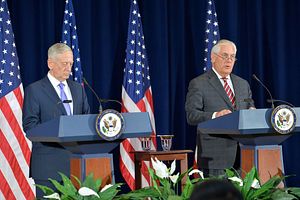Last week, the United States and China held their first-ever Diplomatic and Security Dialogue (D&SD) — one of the four pillars of a new series of bilateral meetings meant to succeed the now-defunct Strategic and Economic Dialogue, the last of which took place in 2016. Roughly analogous to a “two-plus-two” meeting, the D&SD featured the secretaries of state and defense, Rex Tillerson and Jim Mattis, on the U.S. side and Chinese State Councilor Yang Jiechi leading the Chinese side along with General Fang Fenghui, a member of the Central Military Commission and the chief of its joint staff department.
As I noted in my preview of the dialogue, the North Korean question was largely expected to the dominate. Still, with the dialogue taking place a few weeks after the Trump administration authorized its first freedom of navigation operation (FONOP) in the South China Sea, maritime disputes and freedom of navigation were also expected to feature in the talks. As I discussed in a recent commentary for the South China Morning Post, the talks ultimately and unsurprisingly generated few major deliverables, but the United States appeared to have missed an opportunity on the South China Sea.
Similar to the summit between Trump and Chinese President Xi Jinping at Mar-a-Lago earlier this year, the D&SD resulted in no joint U.S.-China readout, fact sheet, or outcomes document. Instead, Tillerson and Mattis gave a press conference outlining the outcomes from the U.S. side and China’s state-run Xinhua news agency released a Chinese readout of the talks.
Both the U.S. press conference and the Chinese readout mention the South China Sea, but the content is quite different. Tillerson, for instance, had the following to say:
We also had a frank exchange of views on the South China Sea. Secretary Mattis and I were clear that the U.S. position remains unchanged. We oppose changes to the status quo of the past through the militarization of outposts in the South China Sea and excessive maritime claims unsupported by international law, and we uphold the freedom of navigation and overflight.
With that said, China has committed to resolve their disputes peacefully and in accordance with recognized principles of international law, including the UN Convention on the Law of the Sea [UNCLOS].
Meanwhile, Xinhua simply noted the following on China’s position on the South China Sea:
On the South China Sea issue, China said it exerts indisputable sovereignty over the South China Sea islands and their adjacent waters and has every right to safeguard its sovereignty and maritime rights.
The Chinese document is the less interesting one here; it simply restates China’s position on the South China Sea, which is heard regularly at Chinese Foreign Ministry press conferences. It is also not surprising that Xinhua’s readout would omit additional details, even though the private deliberations at the D&SD no doubt covered more territory.
Tillerson’s statement, on the other hand, is notable for providing a degree of cover to China for its misbehavior in the South China Sea. Specifically, it’s perplexing that Tillerson would say that China committed to resolving disputes “in accordance with recognized principles of international law, including the UN Convention on the Law of the Sea.”
At worst, as others have noted, this amounts to a repetition of Chinese talking points on the South China Sea. Beijing continues to flout last year’s binding award by a tribunal at the Permanent Court of Arbitration, which found China’s South China Sea claims invalid. Given Beijing’s curt readout simply asserting China’s “indisputable sovereignty,” the statement that China is ready to abide by UNCLOS is an embarrassing misstep by Tillerson — especially given neither he nor Mattis made any reference to last year’s award.
Over the years, China has paired its gradual and low-intensity coercion in the South China Sea with careful diplomatic and legal signaling that seeks to couch its behavior within internationally accepted legal frameworks, including UNCLOS. For the U.S. secretary of state to incredulously note China’s commitment to UNCLOS without referencing the findings of last year’s award is — simply put — a missed opportunity.
This is precisely the kind of scenario that a joint document or declaration would have helped prevent. Even if Yang was able to offer insincere lip-service to UNCLOS in private deliberations, there would likely be no way that the Chinese delegation would have acquiesced to Tillerson’s language in a joint statement. On the other hand, if the U.S. side was able to include reference to UNCLOS in such a document, that too would represent a positive outcome.
Taking a step back, the Trump administration doesn’t appear to have particularly advanced the Obama administration’s South China Sea policy. Perhaps the most lucid statements to date on how this administration sees the South China Sea came from Jim Mattis at the Shangri-La Dialogue in Singapore. Mattis’ speech could very well have been delivered by his predecessor, Ashton Carter.
On the South China Sea, neither the United States nor China appears to have shifted course since last year. Beijing’s major shift has been in terms of its regional diplomacy; it has pursued considerable rapprochement with Southeast Asian claimant states through the Association of Southeast Asian Nations (ASEAN), finding consensus on a toothless draft framework document for a code of conduct.
With the exception of a lone FONOP near Mischief Reef, the Trump administration remains mostly adrift in the South China Sea. The D&SD could have been an opportunity to change that, but it appears that it wasn’t so in the end.

































